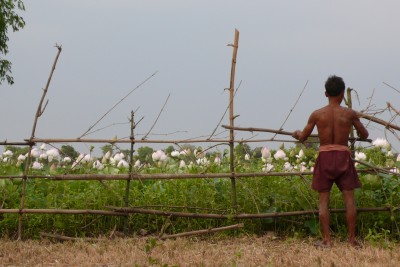
June Rubis recounts part of her one-month solo journey into Cambodia.
Mao, my Cambodian guide with a gap-toothed smile, leans towards me, and whispers conspiringly, “Our King, I think he gay.”
A week ago, I hadn’t envision myself traveling on the road in Cambodia for a month on my own, much less having a heated socio-political discussion with a Khmer man in the lotus fields of Kampong Cham, a rural Cambodian town. It began with a chance phone call with my filmmaker friend who had planned to fly to Phnom Penh, Cambodia, and make his way north towards Luang Prabang, Laos where he would shoot a film. He had planned to only take the same transportation that the locals took — that is, by public bus, stopping in various rural towns along the way.
It sounded romantic, and grand, and so I agreed to accompany him on his trip.
However, on the second day of our stay in Phnom Penh, he had to return due to an unexpected family emergency.
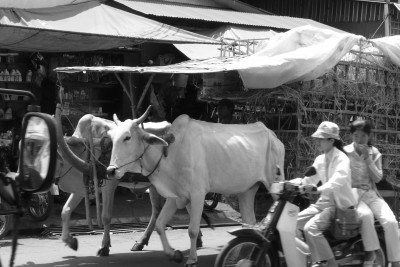
The second evening in Phnom Penh was agonizing — should I return with him, or stay around Phnom Penh for a week and then leave, or take over his trip?
I thought about my past travels and how the best memories were from the unexpected. And so, I decided to take the plunge and travel around Cambodia for a month on my own.
My first stop from Phnom Penh was Kampong Cham, where I met Mao at the local bus stop. The locals were a bit taken aback at the sight of a sole Asian girl traveling by public bus, particularly in a quiet, non-touristy rural town, that it took a while before they approached me for hopes of being employed as a guide. I chose Mao because of his immediate smile, and fluency in English.
“Mao — it means ‘dark skin’ in Khmer,” Mao laughs and gestures to himself, “Like me!”
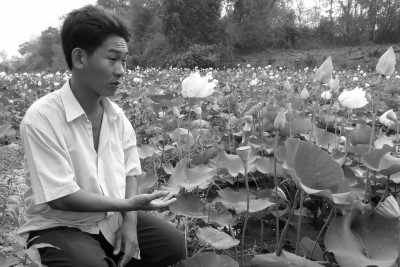
Several hours later, after depositing my backpack in a small guesthouse, I find myself whizzing through the central Cambodian country landscapes on Mao’s motorcycle. We had just seen some temple ruins that were guarded by an armed guard who demanded payment before I could step in (to which I politely said “no, thank you” and left), a very long bamboo bridge (which is apparently a local pride, and also requires an entrance fee), and a haunting and ornate Khmer cemetery.
Stepping carefully through the ruined tombs, I watched a man climb a palm tree 20 meters high on bare feet, to collect palm water for fermentation into a local beverage favourite, palm wine.
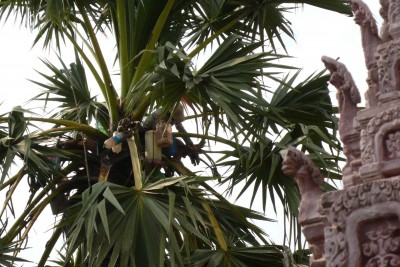
The final part of tour was the lotus fields to which I was initially not interested but Mao had insisted that I had to visit the fields, “because it different.”
His insistence triggered a recent flashback of hanging out by the waterfront at Phnom Penh in the evenings, and watching lithe Khmer girls balancing what seemed to be a heavy load of large trays filled with lotus pods on their heads. None of the other tourists were interested in purchasing the lotus pods, however pods seemed to be a popular snack amongst Khmers, who would crack the lotus seeds in their mouths and spit out the seed coverings. Having recently spent my days trying to dodge heavy traffic, persistent street urchins and touts in Phnom Penh, the vision of another Cambodia of quiet lotus fields, suddenly seemed very appealing. And so I said yes, much to Mao’s delight.
The afternoon heat is slowly dissipating, a sure relief to the bowed backs of the farmers in the fields, who return hesitant smiles to my waves. Half-clad children holler as we weave through the bumpy unpaved road. I take a deep breath, close my eyes and savour the earthy smells of the countryside. It feels so good to get out of bustling Phnom Penh to the quieter rural life of most Cambodians.
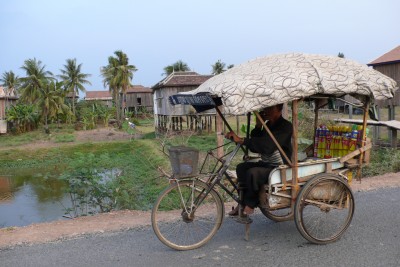
As we weave around a large smiling woman cycling with a small cart filled with sundry goods attached to her bicycle, Mao points at a cluster of bamboo huts along the road and proceeds to give me a personal history of each family that lives in the huts, some of which are not flattering.
“Hey, back home, we call that gossip!” I yell in his ear, while hiding a smile.
“Go – seeep?” Mao savours the new word joyfully, “What is meaning?”
Our shouted conversation weaves from the art of saying nice things about one’s neighbours, to his family, to the local economy, karaoke and Cambodia’s latest singing sensation, and before I know it, we are inside the courtyard of a monastery where the monks return surprised stares as Mao’s motorcycle bounces through. Some of the shaven young men are wearing voluminous orange robes wrapped around their thin bodies, as they lounge on the steps of the temple. An older monk frowns at us, while tugging a rope attached to a stubborn cow.
“Sorry!” I call towards the monks, as I gave a reproachful thump on Mao’s shoulder.
“SO-REEEEEEEE!!” Mao yells back, with laughter, directing his motorcycle towards a narrow beautifully carved stone gateway, scattering scrawny chickens along the way.
Just before I could catch my breath for what it seemed like an impossible, and rather sacrilegious exit, our motorcycle screeches to a halt, to Mao’s proclamation, “We are here!”
I look around eagerly, for the wide vast lotus fields, only to see thorny bushes that block our path.
“We walk through there,” Mao points to the thorny bushes. I am doubtful but so far, Mao has shown me some wonderful non-touristy sights in Cambodia that I would never been able to see on my own, and so after some initial hesitation, I plunged into the bushes right after him. After a good few minutes of disentangling ourselves from the thorns, we drop a couple of feet onto the lotus fields.
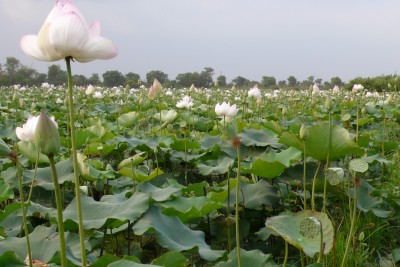
The sight of miles and miles of lotus fields fills me with delight. A flock of an unidentifiable bird species flies above our heads. Aside from a small family gathering lotus pods from a far distance, it seems that we have the fields to ourselves – such a rarity to be alone in Cambodia! Mao directs me to a path, where we walk amongst gently waving lotuses. Because I had initially told him my specific interest in wildlife, Mao delights in showing me some of the local wildlife to behold, and attempts to teach me the names of the animals in Khmer. Breathing in the cooling breeze of slight manure, freshly cut grass and sweat, I crouch next to Mao as we watch a frog swimming in the watery parts of the fields.
This is where we continue our discussion on Khmer life, from the humble origins of part-time guide/wannabe karaoke singer Mao, to the lofty reaches of Khmer high society. Mao is delighted to find out that I have some trivial knowledge of his King: that he is a good cultural dancer and that he used to live in the United States of America.
In turn, I tell him about life in Malaysia, as I know it.
A low singing in Khmer distracts us, and much to my surprise, a farmer walks into view. He is as deeply tanned as Mao, and much more muscular — a sign of a long hard life in the fields. Clad only in red shorts, he pretends that he doesn’t see us and walks into the paddy where he proceeds to cut the lotus pods.
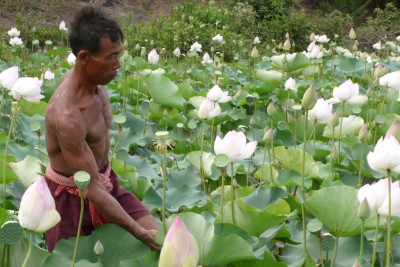
“You want to eat lotus?” Mao asks, gesturing to the lotus pods. “Yes, please!” I reply eagerly, looking forward to a chance to finally try the lotus seeds.
Mao walks towards the farmer and exchanges a few words. The farmer looks at me gravely, and hands Mao a generous portion of his bounty.
When Mao walks to me with the lotus bouquet with a slightly stunned look on his face, I ask him, “How much does it cost?” “It’s free for YOU” he replies, “It’s never free — not for me,” he stresses.
Surprised and pleased, I turn to the farmer, place my palms together and say, “Akun” [Thank you]. He smiles in return.
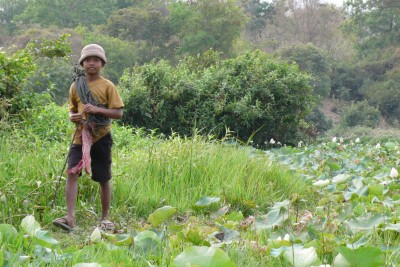
The lotus seeds have a pleasing nutty flavour, and easy to eat, like cracking sunflower seeds albeit from a large green pod. We eat our hearts out until our fingers are sticky and our stomachs slightly uneasy.
The afternoon breeze is starting to chill, and we hear a call from a hidden greater coucal in the distance. A group of boys strolls by us, the tallest boy carrying a metal detector. With a sinking feeling, I thought of my afternoon, walking carefree in the countryside, completely forgetting (despite my trip to Phnom Penh’s Genocide Museum) about the perils of hidden landmines. In Cambodia, certain parts of the countryside are still considered ‘hostile’, and it is not uncommon for a wandering bystander to get struck by an open landmine.
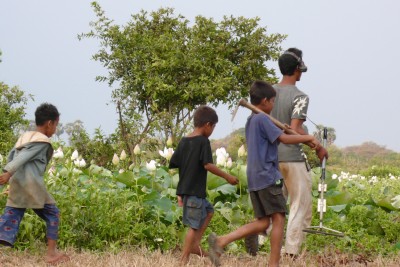
“Don’t worry,” Mao interjects into my thoughts, probably reading my mind, “Here is safe — they only looking for metal objects to sell.”
Relieved, I silently reprimand myself to walk only where the locals are, and to never roam on my own again in Cambodia.
As the sun began to dip down into the horizon, we decide that it is time to leave. We wave our final goodbyes to the farmer, and head back to the thorny path. This time around, heading back to the monastery, both the monks and I are prepared for another quick encounter, exchanging wry smiles as Mao speeds furiously by, without a backward glance.
Lying in my lumpy bed at the motel, I thank my lucky stars to have ‘survived’ my first day of a sole journey on my own. This is not my first solo journey at all however traveling, despite best preparations, are often subjected to sudden changes and butterflies in my stomach for the early days of a journey are almost a certainty.
However, I know the best part of the journey is often in the unexpected small experiences, and even the nervousness plays a role in enjoying the entire trip!
I check my itinerary: tomorrow I get on a bus, for longer haul to Kratie, where the river dolphins are.
As I lean over to turn off the light, I smile to myself, thinking of the graceful lotus pods waving silently in the air.
June Rubis is currently living out of her backpack.

Thanks
I am really lucky to find eating lotus in Cambodia as traveler. Now, I can tell everyone whenever they are going for cambodia travel tale. Everything I can tell to all the people about these travel services.
There is a lots of nice place in Cambodia that you are gonna enjoy..
Hi June,
I also enjoyed reading your story of your travels in Cambodia. I have been there twice in 6 months and will be going again in June. The last trip I took the bus to Battambang and Poipet and crossed the border to Thailand. Something about the poor but simple and happy way of life in Cambodia seems to strike a chord with me.
Will we have more stories to follow about the rest of your sojourn in Canbodia ? I really hope so.
Hi June,
I like reading this.Can I follow you on your travels?hehehe. Anyway, how did your stomach take the lotus seeds?I ate wild lotus seeds at tasik chini once and had severe diarrhea right after. But My guide was nice. He made me a hat out of the lotus leaves. Pretty cool.